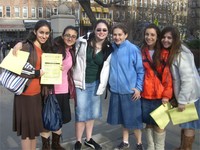Jan 21, 2008 By: yunews
 Jan 21, 2008 -- A group of determined 11th graders from Samuel H. Wang Yeshiva University High School for Girls took to the streets of Manhattan Beach, Brooklyn, on January 8 to spread the word about affordable health insurance to the area’s low-income residents. The 40 teenaged girls may have seemed like unlikely health insurance advocates, but their activities sprang from their school’s commitment to community service as an integral part of a Jewish education.
The project was part of the school’s Mitzvah [good deed] Week, which each year takes half of the 11th grade class to do chesed [outreach] projects in Israel while the other half performs similar activities in New York.
The students began the day at the offices of Metropolitan Council on Jewish Poverty in Lower Manhattan, where they learned about the causes and realities of poverty in the Jewish community, shattering some of their own misconceptions and stereotypes in the process.
Then it was off to the day’s work: helping to enroll the 400,000 adults and 100,000 children in Brooklyn who currently have no health insurance coverage. Manhattan Beach was selected as the neighborhood of choice due to the large number of un-enrolled young families and immigrants there. Depending on income levels, Brooklyn residents can qualify for Child Health Plus or Family Health Plus insurance programs for free or for an extremely low cost.
Armed with Met Council goodie bags and 600 bright orange flyers, the girls marched through the neighborhood, dropping off packs of flyers in grocery stores, doctor’s offices, and mailboxes, and even asking strangers on the street if they had health insurance, and then handing them a flyer.
Yocheved Feinerman, student activities coordinator at YUHSG, said: “[The girls] were exposed to issues and communities that they had never really thought about. It was not only the community service that was so important, but the awareness that there are people who really live without health insurance.”
She noted the story of one student who saw a young mother reading a newly posted flyer while holding her two-year-old son, and went over to the mother to encourage her to sign up.
“They certainly weren’t shy,” said Stefanie Greenberg, Met Council’s volunteer department manager who ran the day. “These girls came in not knowing anything about poverty or why health insurance is important, and when the day was over they couldn’t stop talking about it—they were so enthusiastic,” she said.
On the buses back to school, Greenberg added, girls were calling through the windows to by-passers on the street: “Do you need health insurance? Let me tell you why it’s important!”
Jan 21, 2008 -- A group of determined 11th graders from Samuel H. Wang Yeshiva University High School for Girls took to the streets of Manhattan Beach, Brooklyn, on January 8 to spread the word about affordable health insurance to the area’s low-income residents. The 40 teenaged girls may have seemed like unlikely health insurance advocates, but their activities sprang from their school’s commitment to community service as an integral part of a Jewish education.
The project was part of the school’s Mitzvah [good deed] Week, which each year takes half of the 11th grade class to do chesed [outreach] projects in Israel while the other half performs similar activities in New York.
The students began the day at the offices of Metropolitan Council on Jewish Poverty in Lower Manhattan, where they learned about the causes and realities of poverty in the Jewish community, shattering some of their own misconceptions and stereotypes in the process.
Then it was off to the day’s work: helping to enroll the 400,000 adults and 100,000 children in Brooklyn who currently have no health insurance coverage. Manhattan Beach was selected as the neighborhood of choice due to the large number of un-enrolled young families and immigrants there. Depending on income levels, Brooklyn residents can qualify for Child Health Plus or Family Health Plus insurance programs for free or for an extremely low cost.
Armed with Met Council goodie bags and 600 bright orange flyers, the girls marched through the neighborhood, dropping off packs of flyers in grocery stores, doctor’s offices, and mailboxes, and even asking strangers on the street if they had health insurance, and then handing them a flyer.
Yocheved Feinerman, student activities coordinator at YUHSG, said: “[The girls] were exposed to issues and communities that they had never really thought about. It was not only the community service that was so important, but the awareness that there are people who really live without health insurance.”
She noted the story of one student who saw a young mother reading a newly posted flyer while holding her two-year-old son, and went over to the mother to encourage her to sign up.
“They certainly weren’t shy,” said Stefanie Greenberg, Met Council’s volunteer department manager who ran the day. “These girls came in not knowing anything about poverty or why health insurance is important, and when the day was over they couldn’t stop talking about it—they were so enthusiastic,” she said.
On the buses back to school, Greenberg added, girls were calling through the windows to by-passers on the street: “Do you need health insurance? Let me tell you why it’s important!”